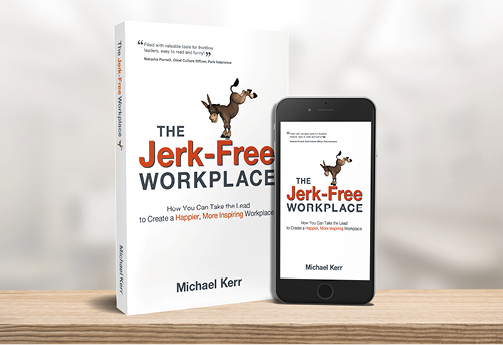Creating a Jerk-Free Workplace: What If YOU’RE the Jerk?
If you want to create a jerk-free workplace then it’s important to ask the question: “What if I’m the jerk?” The following is an excerpt from the introduction of my book, “The Jerk-Free Workplace: How You Can Take the Lead to Create a Happier, More Inspiring Workplace.”
First Do No Harm: Don’t Be a Work Jerk!
“It isn’t the ups and downs that make life difficult; it’s the jerks.” Charlie Chaplin
Don’t be silly. Of course, this chapter isn’t meant for you. Look, we all know you’re not the problem! I can’t believe you’d even think that for a moment!
No, this chapter is for all your annoying coworkers. You know the ones – the gum-popping, loud-talking, idea-stealing, oops-silly-me-I-forgot-to-wear-any-deodorant jerks that infest your workplace.
I’m talking about the jerks that habitually show up late to meetings, who never take responsibility for their own actions, who leave rotting carcasses of half-eaten mystery meats in the refrigerator, and who love telling the most vulgar jokes imaginable just to make people squirm.
I’m talking about the jerks who spread unflattering rumors, who are in love with the reply-all e-mail option, who shoot down your ideas before you’ve finished presenting them, who never notice that the coffee machine needs refilling, and who fancy themselves the self-appointed king or queen of your workplace domain.
I could go on, but you get the point. I’m talking about those attitudes and behaviors that drive you around the bend and back again. 
But I’m definitely not talking about you!
It’s Not Me! It’s Them!
And to prove that I’m not talking about you, please do this simple exercise.
Rate your own overall work attitude on a scale of 1 to 10 – and, yes, for the engineers out there, decimal points are fine. Be honest; now is not the time for modesty! We all know how hard you work, what a fabulous attitude you have, and how much sunshine you bring into everyone’s life day in and day out!
Okay. Got the number? Great. Now, on to part two.
Assign a number on a scale of 1 to 10 that best represents the overall attitude of everyone around you at work. Again, be brutally honest. I won’t make you share this with anyone (mostly because I can’t, because, well, you’re there and I’m here).
Now compare the numbers and answer this question: Was the rating you assigned yourself higher than what you rated the rest of your team?
Of course, it was!
Okay, I don’t know for certain that you rated yourself higher. But here’s what typically happens in my “Inspiring Workplaces” workshops. Of participants, 75-95% admit to rating themselves higher than their colleagues. Studies bear this out as well. Most people, in every line of work, rate themselves higher than the rest of their teammates in terms of their performance.
In other words, what everyone seems to be thinking is this:
“It’s not ME! It’s THEM! If I didn’t have to work with these jerks
I could really get something accomplished around this place!”
This is such a common mindset that there’s a name for it: The “illusory superiority bias” or, in less fancy-schmancy terms, “the above-average effect.”
For example, 74% of people believe they are better drivers than everyone else. In terms of leadership, 80% believe they are better-than-average leaders. In academia, 94% of professors believe they are above average relative to their peers. And 89% of people believe they have an above-average sense of humor. (Of course, only 49% of people can have an above-average sense of humor. I know this because I have an above-average sense of humor. Or, at least I think I do. Uh oh.)
The above-average effect kicks in for many things in life, though of course not for everything. Few people admit to being great at public speaking, dancing, or being able to confidently pull off an orange turtleneck. However, when it comes to our overall attitude and skills that are fundamentally important to our success at work, the above-average effect crops up above average of all the other effects. (See what I did there?)
So, if you rated yourself higher than your peers, please know that’s completely normal, in fact, you might even say you’re above average! However, it also suggests that quite possibly I am speaking to you after all. Sorry for the misdirection.
Besides inflicting you with a serious case of self-doubt, where am I going with this? My intent is decidedly not to fill you with self-doubt when it comes to your abilities. And who knows, maybe you are the rock star in your workplace and you really do work with a bunch of jerks?
But even if that is the case, The Jerk-Free Workplace is still for you, because one of the many points of this book is to remind you that all you can completely control at work is your own attitude, reactions, and behaviors. Yes, without question, as an inspiring leader on your team you can positively influence the people around you, and we’ll get to that. But for now, I simply want to remind you that if you want to be happier at work and work in a more inspiring, less jerk-filled workplace, you need to start with yourself.
Which means asking yourself, “What if sometimes I am the jerk?”
Michael Kerr is a Hall of Fame business speaker who speaks about inspiring workplace cultures, inspiring leadership, and humor in the workplace. He is the author of 8 books, including, The Humor Advantage and The Jerk-Free Workplace.




